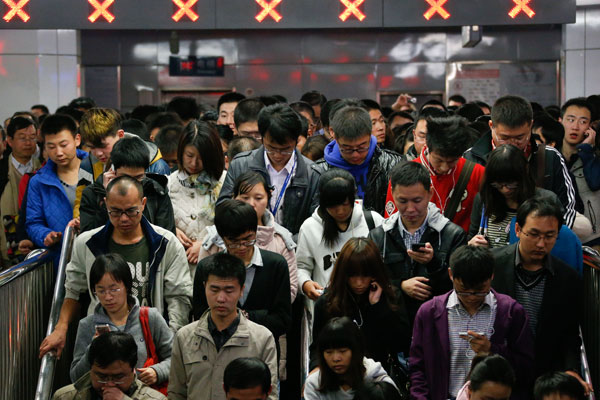If you want to be on time for an important meeting or a date in a crowded city like Beijing, it's wise to leave home early.
But just how much time do you need to set aside for traffic congestion?
On Wednesday, the sustainable development strategy research group under the Chinese Academy of Sciences published China's New-Urbanization Report 2012, the fourth annual report focusing on development strategies amid the country's fast urbanization.
In the previous report, researchers used mathematical models to figure out the average time people spend going from home to their workplaces.
 |
|
Passengers transfer between subway lines at Huixinxijie Nankou station in Beijing in the evening rush hour on Wednesday. Kuang Linhua / China Daily |
But the report immediately triggered controversy because researchers did not count the time spent in traffic congestion. Instead, they were mainly concerned with the distances between residential regions and business regions, and the transportation tools people choose.
This time, the report listed anticipated travel time and actual time spent, and ranked cities accordingly.
Average time wasted in traffic by a passenger in one day is 14 minutes in Beijing, 13 minutes in Tangshan and 12 minutes in Guangzhou, Hangzhou, Shenyang, Taiyuan and Shijiazhuang, putting these cities at the top of the ranking.
"Traffic congestion in peak hours is a kind of urban disease - as cities expand and people gather into cities, there are serious problems we are facing," said Niu Wenyuan, chief scientist and leader of the sustainable development strategy research group under the Chinese Academy of Sciences.
"The cost of traffic congestion is huge. We surveyed the top 15 densely populated cities in China, and found that the time spent in traffic congestion each day in these cities could have been used elsewhere to create 1 billion yuan ($160 million) of wealth," Niu said.
In Shanghai, the actual commuting time is 47 minutes on average, with 11 minutes wasted in traffic jams.
"I think the actual time spent going to work, unless you take the subway, could be at least one hour," said Chen Meng, 30, a Shanghai resident.
"But congestion depends on the direction you are going - if you head north during the morning peak hours, there will be less of a traffic jam than the opposite direction.
"So I think 11 minutes are just a reference, you have to plan your own time according to the distance and direction of your trip," Chen said.
On Oct 15, the Beijing Municipal Commission of Transport reported that the traffic congestion index for September rose 10.3 percent over the same period last year.
Each car in Beijing is banned from traveling inside the Fifth Ring Road on one weekday, depending on the last digit of its license plate.
The commission is now considering restricting 50 percent of cars from the road, which triggered heated debate.
"Traffic control has already brought inconvenience to people, and it is ridiculous that the government wants to increase the inconvenience further," said Zhao Xiaotong, 22, from Beijing.
"If public transportation is convenient enough, people will stop driving cars immediately," she said.
chengyingqi@chinadaily.com.cn
